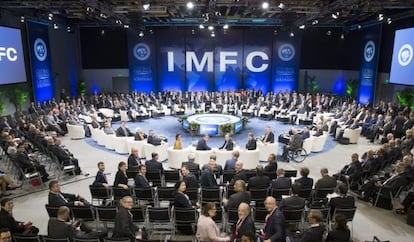Pacific trade deal widens the breach between Latin American economies
Trans-Pacific Partnership shines light on countries that are still dependent on raw materials Slowdown of emerging economies also revealing the many chinks in the region¡¯s armor

The recently signed Trans-Pacific Partnership (TPP) deal has only served to widen the breach in Latin America between those countries with more open economies, and those that are still overly dependent on raw materials. Chile, Mexico and Peru, the only countries in the region that have signed the agreement, are seeing above-average growth figures. Organizations such as the IMF, the OECD and the White House are lobbying for other Latin American countries to join the trade pact, in a bid to revitalize their respective economies and to bring stability to the region.
As a region, Latin America is set to see its GDP shrink by 0.3 percent this year
As Americans like to say, it¡¯s only when the tide goes out that you discover who¡¯s been swimming naked. And the slowdown that the emerging economies are suffering right now, in particular in Latin America, has revealed the many chinks in the region¡¯s armor, in the form of the profound differences between each of them and their disparate medium-term potential. The signing of the TPP deal could deepen those differences.
As a region, Latin America is set to see its GDP shrink by 0.3 percent this year, which can be largely explained by Brazil¡¯s -3 percent rate, Venezuela¡¯s -10 percent, and Ecuador¡¯s -0.6 percent, according to the IMF¡¯s estimates. The most important aspect to all this, perhaps, is that the region¡¯s potential growth is lower than was expected. Meanwhile, Chile, Mexico and Peru have all outstripped regional averages.
¡°It¡¯s no coincidence that the countries with more dynamic economies are also those with more dynamic policies,¡± says ?ngel Melguizo, head of the Latin America and Caribbean Unit at the OECD Development Center, who has been in attendance at the IMF¡¯s Annual Meetings in Lima this week. ¡°The gap can be seen in the deals that are signed and in the numbers,¡± he says.
The figures show that trade, even between the Pacific Alliance countries are very low¡± ?ngel Melguizo, head of the Latin America and Caribbean Unit at the OECD Development Center
The IMF points out that over the last 25 years, Latin America has been largely closed to foreign trade compared to other emerging regions, and says that trade figures for most of the region¡¯s economies are below the level they should be, taking into account their economic fundamentals. ¡°The figures show that trade (even between the Pacific Alliance countries [Chile, Mexico and Peru], are very low,¡± says Melguizo. ¡°Many of them are less integrated into the value chains of their regional neighbors than with China,¡± he says. In fact the main trading partner for most countries in the region, such as Peru, is indeed China. ¡°We are open-minded about working with the 12 countries that make up the TPP,¡± Yi Gang, the deputy governor of the Central Bank of China, told delegates earlier in the week.
Chile, Peru and Mexico are the only Latin American members of the TPP, which still needs to be ratified by their parliaments, something that may not be an easy task. ¡°Although the negotiators have called the agreement ¡®transforming¡¯ there are good reasons to be cautious. To start with there are various obstacles to overcome before it can be implemented,¡± explains Andrew Kenningham, senior economist at London-based Capital Economics. ¡°When all is said and done, the last three trade agreements signed by the United States were only applied four to six years after they were inked,¡± he adds. Barack Obama has the approval of Congress to negotiate trade deals, but the ongoing wrangling in both houses, along with elections in 2016, could stymie the TPP.
Gathered at this week¡¯s IMF meeting, the finance ministers of Chile, Mexico and Peru have celebrated the signing of the agreement, confident that Colombia will soon begin the process of joining the TPP. ¡°We hope that Colombia will join us,¡± said Alonso Segura, Peru¡¯s finance minister. His hopes are shared by Caroline Atkinson, an advisor on international economic affairs to President Obama. ¡°I keep saying that the TPP is an open agreement. During the meeting they held this summer in Washington, President Obama and the president of Brazil, Dilma Rousseff, included this point on their agenda. Until now, Brazil has not looked to the Pacific, but this could change in the future,¡± she added.
Chile¡¯s President Michelle Bachelet has repeatedly called for the need to ¡°find agreement¡± between the Pacific Alliance and Mercosur
Chile¡¯s President Michelle Bachelet has repeatedly called for the need to ¡°find agreement¡± between the Pacific Alliance and Mercosur, the bloc made up of Argentina, Uruguay, Paraguay, Brazil and Venezuela. The IMF agrees, as mentioned in its outlook for the continent: ¡°The proliferation of trade agreements requires stepped-up coordination among the multiple existing and planned initiatives - particularly true for Mercosur and the Pacific Alliance.¡±
But the agreement in itself will not bring about the miracle of the loaves and the fishes. Nobel Prize winner Joseph Stiglitz believes the deal will be ¡°very bad for ordinary workers, the environment and health.¡± In contrast, Melguizo says it offers ¡°a good opportunity as long as it improves training, and boosts infrastructure and logistics.¡±
Tu suscripci¨®n se est¨¢ usando en otro dispositivo
?Quieres a?adir otro usuario a tu suscripci¨®n?
Si contin¨²as leyendo en este dispositivo, no se podr¨¢ leer en el otro.
FlechaTu suscripci¨®n se est¨¢ usando en otro dispositivo y solo puedes acceder a EL PA?S desde un dispositivo a la vez.
Si quieres compartir tu cuenta, cambia tu suscripci¨®n a la modalidad Premium, as¨ª podr¨¢s a?adir otro usuario. Cada uno acceder¨¢ con su propia cuenta de email, lo que os permitir¨¢ personalizar vuestra experiencia en EL PA?S.
?Tienes una suscripci¨®n de empresa? Accede aqu¨ª para contratar m¨¢s cuentas.
En el caso de no saber qui¨¦n est¨¢ usando tu cuenta, te recomendamos cambiar tu contrase?a aqu¨ª.
Si decides continuar compartiendo tu cuenta, este mensaje se mostrar¨¢ en tu dispositivo y en el de la otra persona que est¨¢ usando tu cuenta de forma indefinida, afectando a tu experiencia de lectura. Puedes consultar aqu¨ª los t¨¦rminos y condiciones de la suscripci¨®n digital.









































